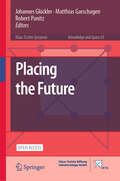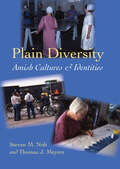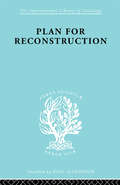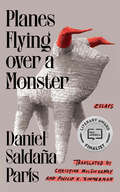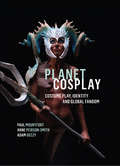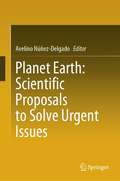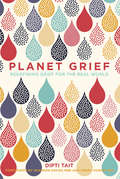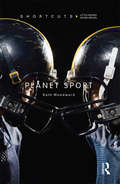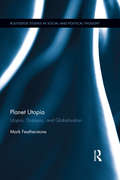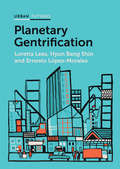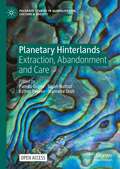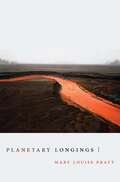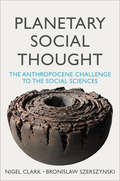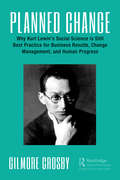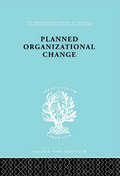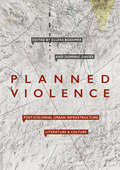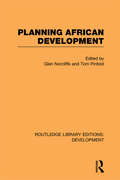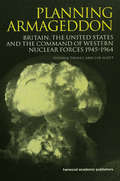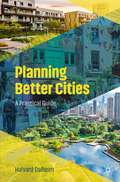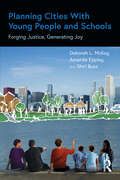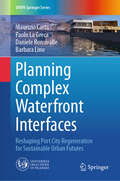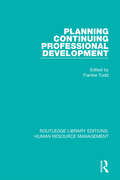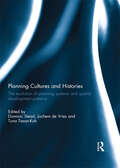- Table View
- List View
Placing the Future (Knowledge and Space #20)
by Johannes Glückler Matthias Garschagen Robert PanitzThis open access book offers a fresh perspective on the uncertainties of the future that humanity faces. Leading scholars from the fields of future studies, planning, geography, history, sociology, design, and the humanities sensitize for the intricate role of geography in building knowledge to anticipate probable, to imagine alternative, and to enact desirable futures. Part I, knowing the future, explores strategies for anticipating possible futures, such as foresight methods, scenarios, and guiding images. This section underscores the importance of cultivating future consciousness to confront societal denial of looming threats like environmental crises. Part II, envisioning the future, delves into various ways societies imagine their futures, exploring topics like the future of food, post-growth economies, extra-terrestrial futures, and even human self-extinction to reveal how futurist scenarios can inform decision making and proactive planning. Part III, enacting the future, focuses on the performative aspects of futuring. The authors in this section examine practices—such as designing, performing, advising, and governing—that are aimed at transforming desired futures into present realities. As part of a series on the interdisciplinary nexus between knowledge and space, this book is an essential resource for researchers, policy makers, planners, students, and practitioners in the fields of sustainability, future studies, regional development, and governance.
Plague-Making and the AIDS
by Gina M. BrightCaptures the social, political, and medical discrimination experienced by people with AIDS in the US, which has resulted from our culture's construction of the disease as a plague.
Plagues (The Darwin College Lectures)
by Sven Friedemann Jonathan L. HeeneyPlagues have inflicted misery and suffering throughout history. They can be traced through generations in our genes, with echoes in religion and literature. Featuring essays arising from the 2014 Darwin College Lectures, this book examines the spectrum of tragic consequences of different types of plagues, from infectious diseases to over-population and computer viruses. The essays analyse the impact that plagues have had on humanity and animals, and their threat to the very survival of the world as we know it. On the theme of plagues, each essay takes a unique perspective, ranging from the impact of plagues on history, medicine, the evolution of species, and biblical metaphors, to their impact on national economies, and even our highly connected digital lifestyles. This engaging and timely collection challenges our understanding of plagues, and asks if plagues are the manifestation of nature's checks and balances in light of human population growth and our impact on climate change. A stimulating collection of essays written by a distinguished group of scholars with a diverse approach to their theme. Provides a multidisciplinary examination of the effects of plagues, from early history to current medicine and the future. Analyses different types of plagues, from infectious diseases to over-population and computer viruses.
Plain Diversity: Amish Cultures and Identities (Young Center Books in Anabaptist and Pietist Studies)
by Steven M. Nolt Thomas J. MeyersPlain and simple. American popular culture has embraced a singular image of Amish culture that is immune to the complexities of the modern world: one-room school houses, horses and buggies, sound and simple morals, and unfaltering faith. But these stereotypes dangerously oversimplify a rich and diverse culture.In fact, contemporary Amish settlements represent a mosaic of practice and conviction. In the first book to describe the complexity of Amish cultural identity, Steven M. Nolt and Thomas J. Meyers explore the interaction of migration history, church discipline, and ethnicity in the community life of nineteen Amish settlements in Indiana. Their extensive field research reveals the factors that influence the distinct and differing Amish identities found in each settlement and how those factors relate to the broad spectrum of Amish settlements throughout North America. Nolt and Meyers find Amish children who attend public schools, Amish household heads who work at luxury mobile home factories, and Amish women who prefer a Wal-Mart shopping cart to a quilting frame. Challenging the plain and simple view of Amish identity, this study raises the intriguing question of how such a diverse people successfully share a common identity in the absence of uniformity.
Plan for Reconstruction (International Library of Sociology)
by W.H. HuttFirst Published in 1998. Routledge is an imprint of Taylor & Francis, an informa company.
Planes Flying over a Monster: Essays
by Daniel Saldaña ParísFinalist for the PEN Translation Prize From one of Mexico&’s most exciting young writers, a cosmopolitan and candid essay collection exploring life in cities across the world and reflecting on the transformative importance of literature in understanding ourselvesIn ten intimate essays, Daniel Saldaña París explores the cities he has lived in, each one home to a new iteration of himself. In Mexico City he&’s a young poet eager to prove himself. In Montreal—an opioid addict desperate for relief. In Madrid—a lonely student seeking pleasure in grotesque extremes. These now diverging, now coalescing selves raise questions: Where can we find authenticity? How do we construct the stories that define us? What if our formative memories are closer to fiction than truth? Saldaña París turns to literature and film, poetry and philosophy for answers. The result is a hybrid of memoir and criticism, "a sensory work, full of soundscapes, filth, planes, closed spaces, open vastness" (El País).
Planet Cosplay: Costume Play, Identity And Global Fandom
by Anne Peirson-Smith Adam Geczy Paul MountfortThis book examines cosplay from a set of ground-breaking disciplinary approaches, highlighting the latest and emerging discourses around this popular cultural practice. Planet Cosplay is authored by widely-published scholars in this field, examining the central aspects of cosplay ranging from sources and sites to performance and play, from sex and gender to production and consumption. Topics discussed include the rise of cosplay as a cultural phenomenon and its role in personal, cultural, and global identities. Planet Cosplay provides a unique, multifaceted examination of the practice from theoretical bases including popular cultural studies, performance studies, gender studies, and transmedia studies. As the title suggests, the book’s purview is global, encompassing some of the main centers of cosplay throughout the United States Asia Europe and Australasia. Each of the chapters offers not only a set of entry points into its subject matter, but also a narrative of the development of cosplay and scholarly approaches to it.
Planet Earth: Scientific Proposals to Solve Urgent Issues
by Avelino Núñez-DelgadoThis book represents the most comprehensive overview of issues affecting our planet and the forefront solutions, including climate change, air, water, soil pollution, demography, and access to food and water. This edited book, led by Prof. Núñez-Delgado, counts with the participation of leading researchers across a wide range of disciplines to be an inspiring and motivating document to promote sustainability and biodiversity. Those of you asking for trustworthy analyses about sustainability and climate change and the vanguard solutions will find this book fascinating.
Planet Grief: Redefining Grief for the Real World
by Penny Power Dipti Tait Sharron DaviesWe all grieve. From the moment we are born into this cold, loud, bright world, we experience change and loss that can often threaten to overwhelm us, but – when managed well – can help mould us into our strongest, most powerful selves.Grief is not only about death: it is part of our everyday lives. We are all grieving something. We grieve when our life changes – when meaningful relationships end, when we move house, change schools or jobs, and when our sense of identity and reality are under threat. We also grieve on a larger level – for a lost way of life and for our planet, particularly in these times of climate crisis, pandemic, fast-moving technology, misinformation and societal division. Grief can even be found in joy and is one of the most universal shared emotions, connecting people across the world in an act of love.In this surprisingly uplifting book, acclaimed grief therapist Dipti Tait draws on her own professional and personal experiences, her clients’ stories and the neuroscience behind our emotions to redefine grief for our fast-paced lives and this sometimes alarming yet wonderful world we live in.
Planet Sport (Shortcuts)
by Kath WoodwardSport generates some of the most intense feelings and levels of commitment. It is big business globally, but also the source of the most powerful personal identifications and individual and collective pleasures. Sporting events are routine and embodied, whether in the gym, on the field or at the training ground, and they are also spectacular, for example in mega events at the stadium or, for followers at a distance, through the media of television, radio and the Internet. Large numbers of people are caught up in personal and collective investment and public engagement with sport. Why does it matter so much? In this book, Woodward demonstrates why sport matters and how, arguing that we should take sport seriously, and explore what is social about it. Sport is not just another domain to which social theories can be applied; it is also distinctive and generates new ways of thinking about social issues and debates. Sport is affected by the global economy and social, political and cultural processes – but it also shapes the wider social terrain of which it is part. Sport reproduces inequalities as well as offering opportunities. It is not always a level playing field. Sport is more than play. Planet Sport is an engaging and concise introduction to some of the big issues in contemporary debates about sport in globalised societies, and will appeal to students, academics and general readers alike.
Planet Utopia: Utopia, Dystopia, and Globalisation (Routledge Studies in Social and Political Thought)
by Mark FeatherstoneThe key figure of the capitalist utopia is the individual who is ultimately free. The capitalist’s ideal society is designed to protect this freedom. However, within Planet Utopia: Utopia, Dystopia, Globalisation, Featherstone argues that capitalist utopian vision, which is most clearly expressed in theories of global finance, is no longer sustainable today. This book concerns the status of utopian thinking in contemporary global society and the possibility of imagining alternative ways of living outside of capitalism. Using a range of sociological and philosophical theories to write the first intellectual history of the capitalist utopia in English, Featherstone provokes the reader into thinking about ways of moving beyond this model of organising social life through sociological modes of thought. Indeed, this enlightening volume seeks to show how utopian thinking about the way people should live has been progressively captured by capitalism with the result that it is difficult to imagine alternatives to capitalist society today. Presenting sociology and sociological thinking as a utopian alternative to the capitalist utopia, Planet Utopia will appeal to postgraduate and postdoctoral students interested in subjects including Sociology, Social Theory, Cultural Studies, Cultural Theory and Continental Philosophy.
Planetary Gentrification
by Ernesto López-Morales Hyun Bang Shin Loretta LeesThis is the first book in Polity's new 'Urban Futures' series.At the beginning of the twenty-first century, proclamations rang out that gentrification had gone global. But what do we mean by 'gentrification' today? How can we compare 'gentrification' in New York and London with that in Shanghai, Johannesburg, Mumbai and Rio de Janeiro? This book argues that gentrification is one of the most significant and socially unjust processes affecting cities worldwide today, and one that demands renewed critical assessment.Drawing on the 'new' comparative urbanism and writings on planetary urbanization, the authors undertake a much-needed transurban analysis underpinned by a critical political economy approach. Looking beyond the usual gentrification suspects in Europe and North America to non-Western cases, from slum gentrification to mega-displacement, they show that gentrification has unfolded at a planetary scale, but it has not assumed a North to South or West to East trajectory ? the story is much more complex than that. Rich with empirical detail, yet wide-ranging, Planetary Gentrification unhinges, unsettles and provincializes Western notions of urban development. It will be invaluable to students and scholars interested in the future of cities and the production of a truly global urban studies, and equally importantly to all those committed to social justice in cities.
Planetary Hinterlands: Extraction, Abandonment and Care (Palgrave Studies in Globalization, Culture and Society)
by Sarah Nuttall Hanneke Stuit Esther Peeren Pamila GuptaThis open access book considers the concept of the hinterland as a crucial tool for understanding the global and planetary present as a time defined by the lasting legacies of colonialism, increasing labor precarity under late capitalist regimes, and looming climate disasters. Traditionally seen to serve a (colonial) port or market town, the hinterland here becomes a lens to attend to the times and spaces shaped and experienced across the received categories of the urban, rural, wilderness or nature. In straddling these categories, the concept of the hinterland foregrounds the human and more-than-human lively processes and forms of care that go on even in sites defined by capitalist extraction and political abandonment. Bringing together scholars from the humanities and social sciences, the book rethinks hinterland materialities, affectivities, and ecologies across places and cultural imaginations, Global North and South, urban and rural, and land and water.
Planetary Longings (Dissident Acts)
by Mary Louise PrattIn Planetary Longings eminent cultural theorist Mary Louise Pratt posits that the last decade of the twentieth century and the first decades of the twenty-first mark a turning point in the human and planetary condition. Examining the forces of modernity, neoliberalism, coloniality, and indigeneity in their pre- and postmillennial forms, Pratt reflects on the crisis of futurity that accompanies the millennial turn in relation to environmental disaster and to the new forms of thinking it has catalyzed. She turns to 1990s Latin American vernacular culture, literary fiction, and social movements, which simultaneously registered neoliberalism’s devastating effects and pursued alternate ways of knowing and living. Tracing the workings of colonialism alongside the history of anticolonial struggles and Indigenous mobilizations in the Americas, Pratt analyzes indigeneity both as a key index of coloniality, neoliberal extraction, and ecological destruction, and as a source for alternative modes of thought and being. Ultimately, Pratt demonstrates that the changes on either side of the millennium have catalyzed new forms of world-making and knowledge-making in the face of an unknowable and catastrophic future.
Planetary Social Thought: The Anthropocene Challenge to the Social Sciences
by Nigel Clark Bronislaw SzerszynskiThe Anthropocene has emerged as perhaps the scientific concept of the new millennium. Going further than earlier conceptions of the human–environment relationship, Anthropocene science proposes that human activity is tipping the whole Earth system into a new state, with unpredictable consequences. Social life has become a central ingredient in the dynamics of the planet itself. How should the social sciences respond to the opportunities and challenges posed by this development? In this innovative book, Clark and Szerszynski argue that social thinkers need to revise their own presuppositions about the social: to understand it as the product of a dynamic planet, self-organizing over deep time. They outline ‘planetary social thought’: a transdisciplinary way of thinking social life with and through the Earth. Using a range of case studies, they show how familiar social processes can be radically recast when looked at through a planetary lens, revealing how the world-transforming powers of human social life have always depended on the forging of relations with the inhuman potentialities of our home planet. Presenting a social theory of the planetary, this book will be essential reading for students and scholars interested in humanity’s relation to the changing Earth.
Planned Change: Why Kurt Lewin's Social Science is Still Best Practice for Business Results, Change Management, and Human Progress
by Gilmore Crosby"Gil Crosby has accomplished what most of us in the world of applied behavioral science, in general, and OD and T-Group training, in particular, have not—making the theoretical father of our work accessible. Thus, this book is a gift and with it we can understand more deeply and teach others more accurately what Lewin actually stated and meant. Moreover, the book is reader-friendly, visually appealing, and humorous rather than academically boring. Thank you, Gil!" Dr. W. Warner Burke E.L. Thorndike Professor of Psychology and Education Teachers College, Columbia University Kurt Lewin (1890-1947) was a visionary psychologist and social scientist who used rigorous research methods to establish an approach to planned change that is both practical and reliable. He mentored and inspired most of the early professionals who came to identify themselves as practitioners of organization development (OD). He also fostered the emergence of the experiential learning method known as the T-group, which uniquely structures group dynamics into a laboratory for dramatic individual and team development. In the early days, most OD professionals learned much about themselves and about group dynamics through T-group experiences. Lewin’s methods, though little known, yield consistent business results such as increased performance and improved morale. His approaches have the rare impact of not just changing behavior, but changing the beliefs that underlie behavior. Sadly, most OD professionals today— business and organizational leaders, community organizers, and people, in general—have never read any of Lewin’s actual writing beyond a quote or two. Indeed, some in the OD profession have rejected or distanced themselves from what they think Lewin taught, even though they and many others seem to know very little about his methods or history. Because Lewin was a prolific writer, one of the author’s main goals is to organize his immense body of published work so that readers can easily explore the source material and form their own opinions. Essentially, this book is aimed at introducing Lewin in a new way, both simplified yet substantial enough to guide anyone who is trying to plan change, whether at the individual, group/team, organizational, or societal levels. Lewin was not trying to create methods for OD professionals alone (or for social scientists as he regarded himself). In his interventions, he taught those how to do their own version of planned change. He believed social science might be the light that helps create a brighter future for humanity. This text transfers this knowledge to a broad audience so that each reader can more successfully implement organizational and social change.
Planned Organizn Chang Ils 158 (International Library of Sociology)
by Garth N JonesFirst published in 1998. Routledge is an imprint of Taylor & Francis, an informa company.
Planned Violence: Post/Colonial Urban Infrastructure, Literature and Culture
by Dominic Davies Elleke BoehmerThis book brings the insights of social geographers and cultural historians into a critical dialogue with literary narratives of urban culture and theories of literary cultural production. In so doing, it explores new ways of conceptualizing the relationship between urban planning, its often violent effects, and literature. Comparing the spatial pasts and presents of the post-imperial and post/colonial cities of London, Delhi and Johannesburg, but also including case studies of other cities, such as Chicago, Belfast, Jerusalem and Mumbai, Planned Violence investigates how that iconic site of modernity, the colonial city, was imagined by its planners — and how this urban imagination, and the cultural and social interventions that arose in response to it, made violence a part of the everyday social life of its subjects. Throughout, however, the collection also explores the extent to which literary and cultural productions might actively resist infrastructures of planned violence, and imagine alternative ways of inhabiting post/colonial city spaces.
Planning African Development (Routledge Library Editions: Development)
by Glen Norcliffe Tom PinfoldFirst published in 1981, this book concerns specifically the Kenyan experience with regards to development planning but, given that the problems of hunger poverty and underdevelopment manifest themselves in slightly different forms across all African countries, this book has considerable relevance to development planning across the African continent.The first set of essays in this collection address the question of development which is undoubtedly Africa’s highest development priority. The second grouping of essays considers issues in project planning and asks questions concerning cost, method, outcome and evaluation of various projects in Kenya
Planning Armageddon: Britain, the United States and the Command of Western Nuclear Forces, 1945-1964 (Routledge Studies In The History Of Science, Technology And Medicine Ser. #8)
by Len Scott Dr Stephen Twigge Stephen TwiggePlanning Armageddon provides the first detailed account of Britain's Command, Control, Intelligence and Communications infrastructure. A central theme of the book is the British-American atomic relationship and its implications for NATO strategy. Based on the recollections of officials and military officers in both Britain and the United States and
Planning Better Cities: A Practical Guide
by Halvard DalheimThis textbook provides an accessible, practical guide to the strategic planning process required for the preparation of city plans from entire metropolitan areas to town centres. It fills a gap in the academic literature on the topic of strategic planning. Its conceptual and practical content together with a student friendly style and high use of practical examples make it accessible to both the student and recent graduate. Its presentation in three parts allows the reader or course leader to access those sections relevant to either their learning requirements or day-to-day work activities. The book is clearly structured into three-parts and provides flexibility in approach and learning for students taking relevant planning courses. The extensive reading list at the conclusion of each chapter provides the student with an opportunity to explore in more detail the individual topics. The practical approach equips the recent graduate with a deeper understanding of the purpose of each element of strategic planning from how to prepare a research brief to how to approach community engagement activities.
Planning Cities With Young People and Schools: Forging Justice, Generating Joy
by Deborah L. McKoy Amanda Eppley Shirl BussOffering the overlooked but essential viewpoint of young people from low-income communities of color and their public schools, Planning Cities With Young People and Schools offers an urgently needed set of best-practice recommendations for urban planners to change the status quo and reimagine the future of our cities for and with young people. Working with more than 10,000 students over two decades from the San Francisco Bay Area, to New York, to Tohoku, Japan, this work produces a wealth of insights on issues ranging from environmental planning, housing, transportation, regional planning, and urban education. Part I presents a theory of change for planning more equitable, youth-friendly cities by cultivating intergenerational communities of practice where young people work alongside city planners and adult professionals. Part II explores youth engagement in resilience, housing, and transportation planning through an analysis of literature and international examples of engaging children and youth in city planning. Part III speaks directly to practitioners, scholars, and students alike, presenting "Six Essentials for Planning Just and Joyful Cities" as necessary precursors to effective city planning with and for our most marginalized, children, youth, and public schools. For academics, policy makers, and practitioners, this book raises the importance of education systems and young people as critical to urban planning and the future of our cities.
Planning Complex Waterfront Interfaces: Reshaping Port City Regeneration for Sustainable Urban Futures (UNIPA Springer Series)
by Maurizio Carta Daniele Ronsivalle Paolo La Greca Barbara LinoThis book presents a comprehensive examination of the complex interactions between port systems and urban environments, with a particular focus on international methodologies and site-specific case studies from the waterfronts of Palermo and Catania and the West Sicily Sea Authority. It addresses the multifaceted challenges and opportunities inherent in waterfront regeneration, emphasizing the critical importance of developing new urban interfaces that seamlessly connect ports to their surrounding cities. These interfaces serve not only as physical transitions but also as vital cultural and economic linkages that foster community engagement and enhance the liveability of urban spaces. The work offers a series of detailed analyses that highlight the necessity of integrating heritage protection within contemporary urban planning frameworks. By exploring historical developments and current initiatives, it provides valuable insights applicable to diverse global contexts, making it relevant for policymakers, urban planners, and scholars dedicated to understanding the future of port cities. Through rigorous exploration of strategic planning and stakeholder engagement, this book highlights pathways toward innovative solutions that respect historical contexts while advancing sustainable urban futures. By prioritizing the creation of effective urban interfaces, it contributes to the broader discourse on port-city relationships worldwide, underscoring their significance in shaping resilient and vibrant urban environments.
Planning Continuing Professional Development (Routledge Library Editions: Human Resource Management Ser.)
by Frankie ToddContinuing professional development (CPD) aims to maintain or improve the quality of professional performance. So far, it tends to have been designed for specific professional groups such as teachers, doctors, architects or engineers. Approaches, as a result, have often been local, separatist or idiosyncratic in nature. This book, first published in 1987, argues that CPD designers should consider strategies used for professional groups other than their own. This title will be useful to anyone with a responsibility for developing and implementing courses and also to practitioners themselves, as well as to students of business studies.
Planning Cultures and Histories: The evolution of Planning Systems and Spatial Development Patterns
by Dominic Stead, Jochem de Vries and Tuna Tasan-KokThis book addresses the influences of planning cultures and histories on the temporal evolution of planning systems and spatial development. As well as providing an international comparative perspective on these issues, the contributions to the book also engage in a search for new conceptual frameworks and alternative points of view to better understand and explain these differences. The book makes three main academic contributions. First, it catalogues some of the key changes in planning systems and the impact on spatial development patterns. Second, it examines the interrelationship between planning cultures and histories from a path-dependency perspective. Third, it discusses the variations in physical development patterns resulting from different planning cultures and histories. Chapters from different parts of the European continent present evidence at different scales to illustrate these aspects. In all cases, the specific combinations of political, ideological, social, economic and technological factors are important determinants of urban and regional planning trajectories as well as spatial development patterns. This book was previously published as a special issue of European Planning Studies.
